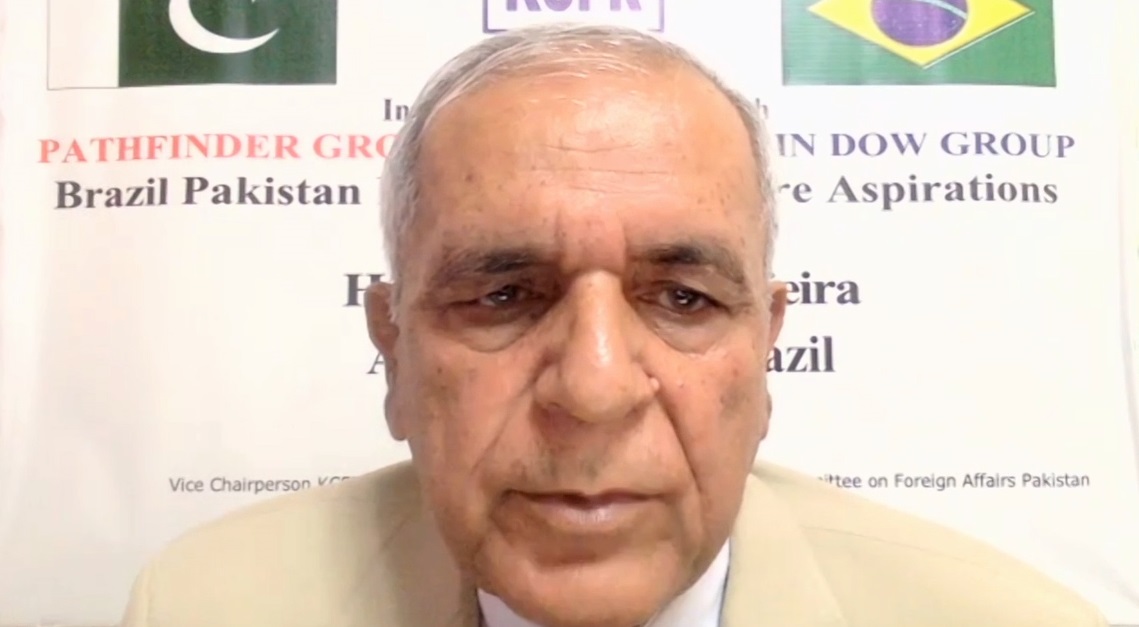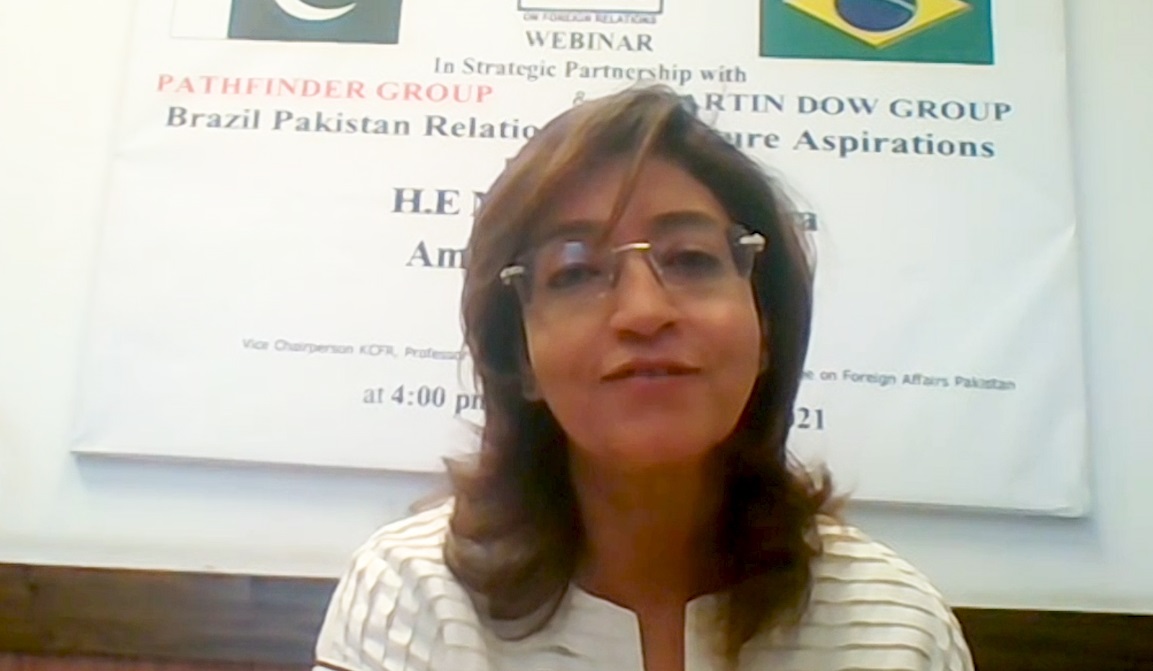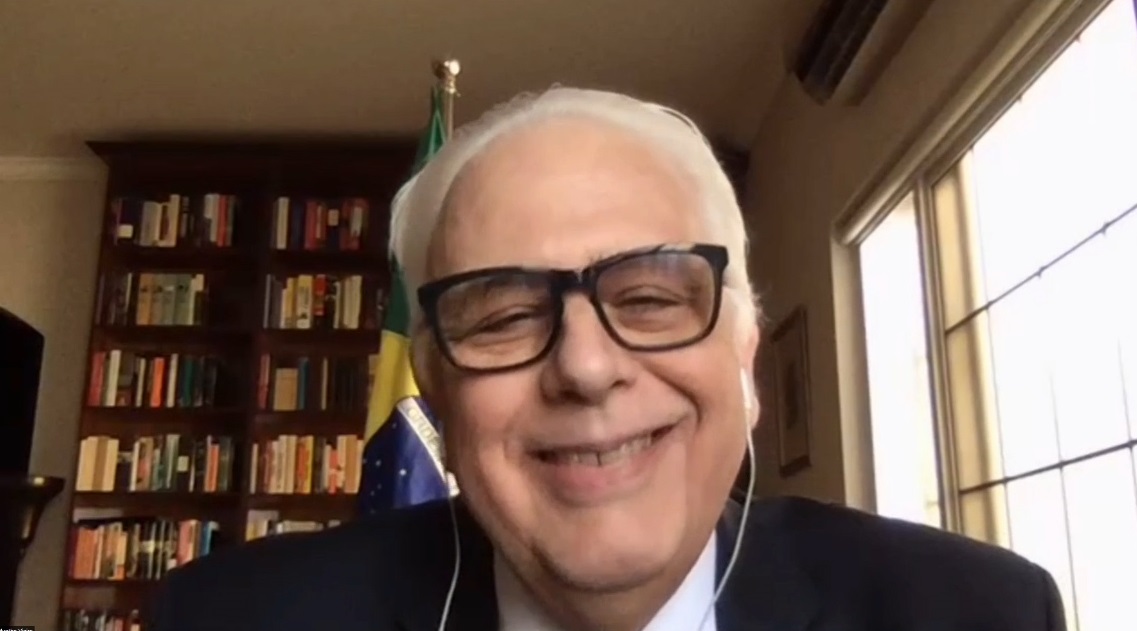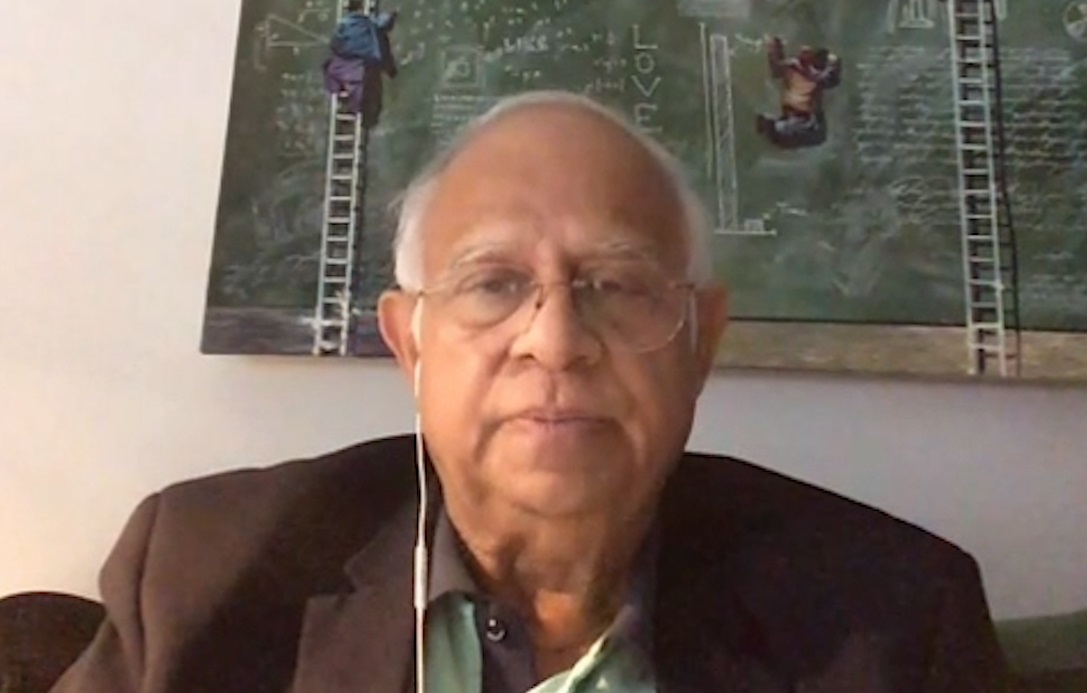The Karachi Council on Foreign Relations (KCFR) held a Webinar on 13 April, 2021 on “Pakistan-Brazil Relations and Future Aspirations” with His Excellency Mr. Olyntho Vieira, Ambassador of Brazil in Pakistan as the Plenary Speaker. Moderated by Commodore (Retd) Sadeed Anwar Malik, Secretary General and CEO KCFR, the webinar was chaired by KCFR Chairman, Mr. Ikram Sehgal.

Cdr(R) Sadeed Malik
Thank you, sir. Bismillah-ir-Rahman-ir-Rahim. Your Excellency Mr. Olyntho Vieira, ambassador of Brazil in Pakistan, distinguished guests, chairman and members of KCFR; ladies and gentlemen, I am Commodore Sadeed Malik, Chief Executive Officer of Karachi Council on Foreign Relations. Before we start, I will very briefly give a short introduction of Karachi Council on Foreign Relations. It was founded by late former Chief Justice of Pakistan, Justice Saeed-uz-Zaman Siddiqui and Governor Sindh, followed by federal Minister General Moeen-ud-din Haider, and then Quaid-e-Azam’s grandnephew, former senior advocate Liaquat Merchant followed by former chief of Naval Staff, Admiral, and later Ambassador Shahid Kaleemullah and Ambassdor Shahid Amin too. Sir, we hold seminars, meetings and deliberate mainly on foreign relations and economic affairs. Ever since Covid-19, we now hold webinars. We have held a number of webinars including one with President of Pakistan, President of Azad Jammu and Kashmir, Security Advisor to the Prime Minister of Pakistan, Education Minister, former Finance Minister, a number of ambassadors from a number of countries at Islamabad, and delegates from foreign countries.
Today’s program will be moderated by Dr. Huma Baqai, professor at IBA, Karachi and member of the advisory committee on Foreign Affairs appointed by the Prime Minister of Pakistan, and she is our vice chair. The webinar will end with concluding remarks and a vote of thanks by our Chairman Ikram Sehgal. May I now request Dr. Huma Baqai to welcome his Excellency Mr. Olyntho Vieira.

Dr. Huma Baqai
Good evening, good morning and Assalam-o-alaikum, as always it is a pleasure to welcome a luminary like you to the forum of Karachi Council on Foreign Relations. Like Mr. Sadeed Malik just said, we do this quite regularly and we have had some very high profile people talking to our members. This is also open to public so you have a wide audience, and later on we also put it up on social media and other channels so the multiplying effect of the talk that you have today is going to be immense.
Excellency Mr. Olyntho Vieira ambassador of Brazil to Pakistan, it is both an honour and a pleasure to welcome you, and we all know that our relationship goes back to 1948 when diplomatic relations between the two countries were established. We also celebrated 20 years of our relationship in 1968 with a lot of cultural exchanges that took place. I think it’s time for more celebrations. What joins us is culture, music and also football. Brazilian football team players are very popular here in Pakistan. They are supported by our youth. But perhaps what I want to say before we hear from you is that Pakistan has now categorically stated that there is a paradigm shift in its foreign policy from just being an exclusively geopolitical state to a geo-economic state. And with that Pakistan has also categorically stated that it is looking for good relations with all our neighbors including functional relations with the very difficult neighbor India. We all know Brazil is part of BRICS, so we would like to hear from you, what is the potential to improve the economic relations between Pakistan and Brazil. Right now what we have, it’s there but it’s not very commendable, and also how do you see the relationship shaping in the years to come? We have 15 participants right now, but more people are joining in so Excellency, over to you and then this will be followed by a Q&A session. We’d like to keep our sessions interactive. Excellency, the floor is yours.

H.E. Mr. Olyntho Vieira
Thank you so much for your words. You have very interesting and quite important questions. You know a lot about our relationship, this makes me more comfortable and at the same time it gives me a larger responsibility. In order to prepare for the debate I made some notes; I tried to create an ambience with what we are and how can we relate to each other. The idea is that we have many similarities, we have many important points in common but at the end I don’t feel that the general public, academicians, businessmen and even politicians, we don’t know each other. I wouldn’t say we don’t know each other very well, I think we don’t know each other. It’s interesting to see and I think it’s part of my mission to make the this knowledge of both parts improved.
So I would say that since the beginning of the diplomatic history, it’s an essential part of an ambassador’s mission to understand the complexities of the society we are sent to. Maybe it could be easier in the romantic times of diplomacy when it would suffice to keep good relations with the sovereigns, but certainly today’s realm is much more challenging and stimulating. So the introduction with organizations such as the Karachi Council on Foreign Relations and the academy offers the opportunity to interpret Pakistan or to make an effort to interpret. Today, I would like to share with you some thoughts about the past, present and future relations of our two countries.
Although Brazil and Pakistan enjoy good relations, I dare to say that each country is mostly unknown to the other, not only to the public but also to specialized audiences such as business people and even academics. To start with, from Brasília to Islamabad, we have about 14,000 kilometers in a straight line to travel from one capital to another, we take about 30 hours door-to-door. So let’s start with some data about Brazil. With 8.5 million square kilometers, Brazil is the fifth largest country by area in the world after Russia, China, Canada and US considering Alaska. We are the sixth largest populated country in the world with 212 million inhabitants, just after Pakistan, which is the fifth. The average age is 31.3 years, 55.5 percent of the population is above 30 years and 14.1% is about 60 years. The GDP for 2020 is 1 trillion US dollars distributed as follows: 6.9% from agriculture, 19.5% from industry, and 73.7% from services.
Although Pakistan is a relatively younger country from the point of view of political organization, it’s one of the oldest known civilization that existed in the Indus Valley 30,000 years ago. On the other hand, our history is much younger. The history of Brazil dates from the period of the Great Navigations or the Age of Discovery. Treaty of Tordesillas signed in 1494 between the Portuguese Empire and the Spanish Empire, the crown of Castile divided the newly discovered lands outside Europe between both reigns along the region about 1200 denied nautical miles west of the Cape Verde Islands. The lengths to the east would belong to Portugal and the west to Spain. In 1500, the Portuguese Navigators arrived at Brazil and took possession of the land on behalf of the king of Portugal. Compared to what to Brazil is today, it was a tiny territory. During the next two centuries, Brazilians in search of gold and precious metals and stones conquered a territory, which is about twice as large and given the current shape which is close to what we are nowadays. Such conquest was recognized by the Treaty of Madrid in 1715.
It’s interesting to note that our borders were basically defined during the colonial years contrasting with United States which expanded their territory very much. Finally at the end of the 19th century and the beginning of the 20th, our borders were completely defined and peacefully defined. Brazil shares borders with 10 countries, all South American countries except Chile and Ecuador.
The colonial era in 1808, 200 years ago when the king of Portugal; this is interesting to see; the king of Portugal moved the empire seat from Lisbon to Rio De Janeiro that year due to the Napoleonic Wars in Europe. When he came back to Portugal, he left his son Pedro as the reagent prince who happened to proclaim the independence of the country in 1822. So next year we celebrated 200 years of independence from Portugal.
Years later in 1889 the Republic was established in Brazil. Today, it is a Federative Republic composed of 26 States and Brasilia, the federal capital. From the demographic point of view, the population was mainly Portuguese, of Portuguese origin and enslaved Africans. After the abolition of slavery the country became a destination for immigrants from all parts of the world, especially Europeans and later the Asians who contributed heavily to give the Brazilian population its multi-ethnic and multicultural character.
Ladies and gentlemen, Brazil and Pakistan have a cordial relationship which is reflected in the multilateral domain, particularly in the area of the trade liberalization and international monetary issues and development. It was mentioned by Dr. Baqai, in 1948 Brazil was the first Latin American country to establish diplomatic relations with Pakistan. In 1952, Brazil opened its embassy in Karachi and Pakistan opened its embassy in Rio de Janeiro. The contacts which have so far being continued were reinforced by the visit of the Brazilian Minister for External Relations to Pakistan in 1984. Furthermore, the Pakistani President visited Brazil in 2004 and the Brazilian Minister for External Relations visited Pakistan in 2005.
We witnessed progress in the field of technical cooperation in the domain of agriculture. In 2018, a scientist from the Federal University of Lavras, which is a university with a very strong agricultural vocation was invited by Comsats to visit Pakistan and identify the potential for technological interchange between our countries. In the same year, a technical cooperation agreement was signed.
Defense is also relevant in the field of cooperation. The Armed Forces of both countries have exchanged students in courses for the training of officers and have participated as observers at joint military exercises. A Memorandum of Understanding for cooperation on defense between the Ministries of Defense of Brazil and Pakistan is in advanced phase of negotiation.
Furthermore, the following areas for cooperation are identified in analysis by the Pakistani side; agreement on juridical cooperation on penal issues, agreement on extradition, agreement on penal sentences, agreement for work by diplomatic personnel and family members, memorandum of understanding between diplomatic academies, and the Brazilian side is analyzing proposals for MoU for the creation of a joint commission for the eradication of hunger and poverty.
In the trade sector, we see an important concentration of imports to Pakistan, about 90% of the total turnover of about 700 million. Brazil is the 20th largest exporter to Pakistan with a share of about 1% of the total, and the 60th largest importer of Pakistani goods with a share of 0.2%. The bulk of Brazilian exports of which about 80% is concentrated in two items i.e. soybean, soy oil and cotton. Brazilian imports from Pakistan are concentrated in surgical and medical instruments and cutlery, about 20 percent of the total, and the textile products about 45%. The inescapable conclusion is that there is an enormous room for growth and diversification. Brazil and Pakistan could have much stronger business and trade links than we actually do.
We know however that people are conducting business in an old-fashioned style. At the end, standards, regulations, etc, are important but what really counts in my view is the personal contact between people who should develop a sort of trustworthiness among the involved parties, an eye to eye contact. This is something I learned in more than 30 years of diplomatic service. The relations among nations can be much smoother when we know we can personally trust our interlocutor. Therefore, this is my advice and request to business people. Gather all the intelligence you can, and then pack your luggage and travel to the prospective market and meet the requirements. It may be expensive, but I assure you, it works.
I have made all these considerations in order to have a minimal set of elements to sketch what we can expect from the bilateral relations between Brazil and Pakistan in the foreseeable future. In political terms we can expect the continuation of the good ambience of friendship and cooperation between our governments justified by the instruments under consideration by both parties and make opportunities of having new ones that we can always suggest and develop.
In the trade and business sector, we will be have to support importers and exporters keeping in mind what I said before about face-to-face contacts. An important idea in my view is the cooperation in scientific and technological domains. It’s well-known that Brazil has become a notable player in agriculture due to long-term investment in research and development and training and education of scientists and technicians. I used to say that we do not export agricultural commodities, we export technology. This is why I would stimulate Pakistani research institutions and other interested parties to try to find how we could work together. Pakistan is an important producer of food who can certainly benefit from technologies that are more efficient. And in the end, I would thank the Karachi Council for the opportunity and re-affirm that the Brazilian embassy is open to any opportunities that can strengthen the links between our two countries. Thank you so much.
Dr. Huma Baqai
Thank you Excellency, that was very candid, very straightforward, but that’s what allows relationships to build further. I think it’s important that you have identified the areas of cooperation i.e. scientific and technological fields, and also how we can come together in the agricultural field. And the most significant or important thing that I picked up from your conversation is that pack up your bags and go visit the country. I wish it was that easy, especially with this pandemic enraging. We all have to fight the pandemic first before we pick up on that proposition. Having said this, the first question that I have for you is from who is from a board member, he says that he is a huge fan of Brazilian football team, supports them, and you know that in a small corner in Karachi, Lyari, we have some very potentially good football players. So the question is that can there be a collaboration, mentoring for our players from Brazil, is that an option especially because your players have come to Pakistan and we still talk about them.
H.E. Mr. Olyntho Vieira
Thank you. I think well, of course football is always a passion. Even today, you will know, football and big business grow together. I am old enough to say that I’m lost out about the romantic years of football. But having said that, I know that there are some conversations to bring some Brazilian coaches or specialists to help the development of football in Pakistan. We had in the past, some more structured programs, but I must tell you that the budget today doesn’t allow great projects, but I know that even here in Islamabad there are some conversations on football on a small scale,so I think this is a possibility, and we certainly can insist with Brasilia that perhaps we should develop a program for interchange. I know that in the past, there were some projects, some talented young people could go to Brazil and stay some time there to learn how to play football. So I think this is a good idea and we can perhaps work on that.
Dr. Huma Baqai
Thank you Excellency, it would also sort of give us an opportunity to get to know each other better. Nothing goes far than sports diplomacy.
We have another question on a more serious note. The question is, would Brazil like to avail China-Pakistan Economic Corridor for reaching Central Asian States and increasing Brazilian trade with them? What I perhaps want to add to this is that investment in the industrial zones in Pakistan established by China are now open. Does Brazil see that as an option to invest in Pakistan?
H.E. Mr. Olyntho Vieira
I think this could be an interesting opportunity, yes. The Economic Corridor will make the flow of goods more efficient. I’m not sure that we have infrastructure companies investing abroad at this very moment, but I think this is an opportunity that has to be explored. And when the world will be out of this crisis in a year or two I think we may consider that possibility. We understand that China Pakistan Economic Corridor is part of a larger project so I think the integration of the main producing areas is inevitable. I think this is perhaps more of an intellectual concern of mine, what will be the face of the world in the five years to come? We have seen that this pandemic has affected very much the airline industry, and the tourism industry. I don’t know how the supply chains will be in the next 10 years or five years, because considering that the work could be segmented and the more efficient producers would have an advantage. This is some difficulty that exists today. Countries will change to limit some strategic items of their portfolio within their borders, this is a question that may be the economists can answer. I am just curious and trying to have a sort of political vision on that but I used to say that many years ago in university I remember that it was a classic case of one brand of sports goods in probably the 60s, it was decided that they would concentrate the design and marketing and development of products in their headquarters in US and the production all over the world where it would be more convenient and cheaper to produce those items.
Dr. Huma Baqai
Excellency, I have a question for you. We are the fifth most populous country and you are the sixth most populous country. I was just wondering how you are handling your vaccine rollout. Where do you stand on the third wave of the pandemic? How is Brazil grappling with it? Do you see it as a success story or is Brazil struggling with it?
H.E. Mr. Olyntho Vieira
I think it is a fact that we still have many problems, the variants are there. Up to today, I think we vaccinated about 10% to 12% of the population with at least one shot. It’s not enough, and we all know that you mentioned it in the very beginning different from the change from geopolitical to geo-economics. The vaccine issue will become a classic in this area. We know that countries who have the laboratories have developed the vaccines, they bought vaccines for five to ten times their own populations and someone has to be without vaccines. So probably they are very sad, but they don’t care; that’s my view.
Dr. Huma Baqai
I think its time we rethink campus capitalism and we rethink also perhaps nationalism, the pandemic has just given us a whole new range of challenges, you know, Pakistan is also working very hard to improve its climate and its tourist industry. Would Brazil be interested in collaboration there?
H.E. Mr. Olyntho Vieira
Probably. I think like Brazil, Pakistan has many beautiful landscapes and natural resources that should be explored so I think it’s an interesting field. We have some technology that we can put at your disposal. So, it’s an interesting area to work together, definitely.
Dr. Huma Baqai
Essentially, Excellency what you’re saying is that there’s a lot of potential in our relationship but this potential needs to be explored. And I hope with this change of thrust in Pakistan’s foreign policy, we will improve our trade relations, our cultural relations, and of course collaborate on tourism as well. With that, I will now hand it over to Mr. Sadeed Malik and Mr. Ikram Sehgal to conclude the session.
Cdr(R) Sadeed Malik
Thank you very much Dr. Huma Baqai. It was an interesting session, and thank you for replying to all our questions. May I now request our Chairman for his concluding remarks. Chairman Ikram Sehgal, sir.

KCFR Chairman Ikram Sehgal
Excellency, it’s been wonderful listening to you and of course I am much better educated because of all the information that you’ve given. But let me tell you something that Dr. Huma Baqai raised, which is very important to both the countries and people do not realize it. One of the distances for your soybean exports to China; you export about 83 million metric tonnes. In China, you are the biggest importer of soybean. Now one of the major problems of China has been getting that soybean to Southwest China and actually some parts of Central Asia like Uzbekistan, Mongolia, which also depend on these exports. The shortest distance to Southwest China and Central Asia both by sea and by road is from ports of Brazil to Gwadar and from Gwadar through the China Pakistan Economic Corridor. What we talk about now, which is more important is the north-south corridor, which is now linking up Central Asia and Eurasia, what we would like to call the Eurasia Corridor. And actually, if you think about it, if you look at the sea distance from Gwadar to Brazilian ports, the land distance from Gwadar to Southwest China and Central Asia, this becomes in fact a very important corridor. We were just calculating quickly, and I think it cut down both in terms of cost and in terms of timing. So it would be very interesting to do a much more extensive exercise on this, because both from China’s point of view and from Brazil point of view, and Pakistan’s point of view as a transit state, and you know, some parts of Central Asia are deficient, like China is, in soybean. Of course some of it comes from Europe and even from Europe it comes via the long route. So with the road rail corridors that are coming into existence, this would be a great thing. I also note the other points that you have raised and we would like to further interact with you so that the business community also comes to know more of the potential that Brazil as such a big country provides to Pakistan. And you are very right, it is a long distance to go to and takes time, but the opportunities are there, and the challenges which are there are sort of dwarfed by the opportunities that can happen. So thank you very much Excellency, very kind of you to have participated with us, and we look forward to further interaction with you in the future.
Cdr(R) Sadeed Malik
Thank you very much, all panelists and attendees. Zoom has provided us an excellent opportunity. We used to have seminars where our ambassadors and speakers would come to Karachi, but thanks to Zoom that right from America, our Chairman is there, you are in Islamabad and many of us here, and few from Saudi Arabia and other countries are also participating. Thank you very much.




